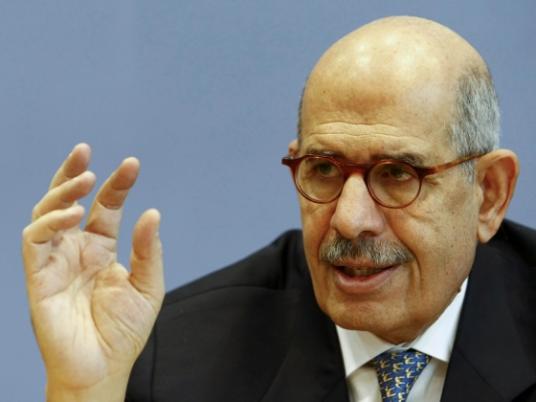
In Thursday’s papers, a baffling dialogue dilemma unfolds in all its glory.
Many of the country's political forces see national talks, designed to bring a variety of polarizing figures together, as the only way to end ongoing violence that erupted last week. But to gain the upper hand, it seems leaders prefer to be the one issuing an invitation, versus actually accepting anyone else's request to talk.
According to Al-Shorouk newspaper, a privately owned daily, the president's office refuses to meet with Dostour Party leader Mohamed ElBaradei, who called for talks on Wednesday that would include the National Salvation Front, the Freedom and Justice Party, Salafi leaders and the interior and defense ministers.
The rejection comes just days after the NSF had issued its own refusal to attend talks set to be hosted by President Mohamed Morsy. The political posturing has left both sides essentially calling for a dialogue with their hands tied since no one has agreed to attend either proposed meeting.
Al-Shorouk quotes sources in the president's office and the Muslim Brotherhood as saying that ElBaradei’s plan to invite the defense minister puts the country at risk of returning to military rule.
While ElBaradei and Morsy argue over competing national dialogues, others are forging some unlikely partnerships.
Independent daily Al-Sabah runs the headline "The Nour Party turning against the Brotherhood," reporting that party met with the National Salvation Front at the Wafd party headquarters.
A Nour-led collective is echoing the NSF's earlier demands that the president sack the current Cabinet and form another coalition government that represents all political parties. It also calls on Morsy to end the curfew imposed on the canal governorates of Suez, Port Said and Ismailia. The paper reports that the Muslim Brotherhood is upset that it wasn't informed of the Nour initiative.
Al-Shorouk spoke to analysts who claim the move is a political maneuver by the opposition to end the Nour Party alliance with the Muslim Brotherhood and could change the Islamic-secular polarization that has characterized past elections.
"Morsy's regime approaches Mubarak's ending," reads an Al-Wafd headline. The liberal party writes that the Salafis have abandoned the Brotherhood, which may signal an end to the group's time in power.
The newspaper retraces Morsy's inability to gain control of political factions and protesters recently, arguing that the situation greatly resembles Mubarak's last days in office during the 25 January Revolution. To emphasize its point, Al-Wafd prints pictures of Mubarak and Morsy in identical poses, each raising his finger threateningly during separate speeches.
While most of Egypt's print media focuses on protests, the Freedom and Justice party newspaper instead chooses to cover Morsy's "successful" meeting in Germany with Chancellor Angela Merkel. The newspaper reports that Germany plans to loan Egypt 354 million euros in aid.
In a special report, independent daily Al-Watan runs an exposé of the militias that have formed in Egypt during the most recent clashes. However, its sensationalist coverage fails to recognize that most of the groups profiled aren't actually militias.
For example, the newspaper claims some obscure Christian groups have formed organized militias with the aim of inciting violence, despite the fact that these groups are no longer active in Egypt. The newspaper profiles the Ultras Ahlawy football fans as a militia, citing fireworks as their weapon of choice.
Al-Watan also profiles a strange group called “The People of Vendetta," claiming they are a real, organized force to be reckoned with after seeing people protesting in paper Guy Fox masks over the last few months. The report mentions a so-called armed militia “The Brotherhood’s Troop 95,” which has previously appeared in other media reports amid much speculation.
Lastly, the paper profiles the Black Bloc, which it describes as masked protesters that have appeared recently. According to Al-Watan, the group of masked protesters is responsible for several vandalism incidents and is mostly made up of young boys known as the “the Facebook generation in black.”
In more serious news, state-run daily Al-Ahram reports on the growing unrest among Central Security Forces. After several CSF personnel were killed or injured in the recent wave of violence, many are now demanding weapons to defend themselves and threatening to strike if these demands are not met.
Egypt’s papers:
Al-Ahram: Daily, state-run, largest distribution in Egypt
Al-Akhbar: Daily, state-run, second to Al-Ahram in institutional size
Al-Gomhurriya: Daily, state-run
Rose al-Youssef: Daily, state-run
Al-Dostour: Daily, privately owned
Al-Shorouk: Daily, privately owned
Al-Watan: Daily, privately owned
Al-Wafd: Daily, published by the liberal Wafd Party
Youm7: Daily, privately owned
Al-Tahrir: Daily, privately owned
Al-Sabah: Daily, privately owned
Freedom and Justice: Daily, published by the Muslim Brotherhood's Freedom and Justice Party
Sawt al-Umma: Weekly, privately owned
Al-Arabi: Weekly, published by the Nasserist Party
Al-Nour: Official paper of the Salafi Nour Party




